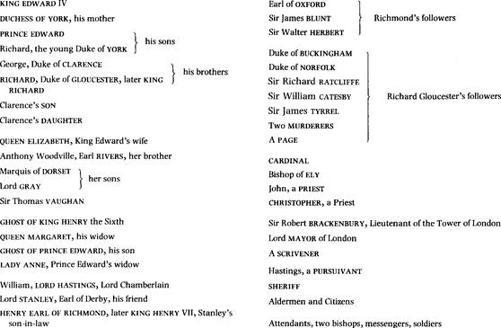Colley Cibber’s adaptation (1700) of Richard III, incorporating the death of Henry VI, shortening and adapting the play, and making the central role (played by Cibber) even more dominant than it had originally been, held the stage with great success until the late nineteenth century. Since then, Shakespeare’s text has been restored (though usually abbreviated—next to Hamlet, this is Shakespeare’s longest play), and the role of Richard has continued to present a rewarding challenge to leading actors.
THE PERSONS OF THE PLAY

The Tragedy of King Richard the Third
1.1 Enter Richard Duke of Gloucester
RICHARD GLOUCESTER
Now is the winter of our discontent
Made glorious summer by this son of York;
And all the clouds that loured upon our house
In the deep bosom of the ocean buried.
Now are our brows bound with victorious wreaths,
Our bruised arms hung up for monuments,
Our stern alarums changed to merry meetings,
Our dreadful marches to delightful measures.
Grim-visaged war hath smoothed his wrinkled front,
And now—instead of mounting barbed steeds
To fright the souls of fearful adversaries—
He capers nimbly in a lady’s chamber
To the lascivious pleasing of a lute.
But I, that am not shaped for sportive tricks
Nor made to court an amorous looking-glass,
I that am rudely stamped and want love’s majesty
To strut before a wanton ambling nymph,
I that am curtailed of this fair proportion,
Cheated of feature by dissembling nature,
Deformed, unfinished, sent before my time
Into this breathing world scarce half made up—
And that so lamely and unfashionable
That dogs bark at me as I halt by them—
Why, I in this weak piping time of peace
Have no delight to pass away the time,
Unless to spy my shadow in the sun
And descant on mine own deformity.
And therefore since I cannot prove a lover
To entertain these fair well-spoken days,
I am determined to prove a villain
And hate the idle pleasures of these days.
Plots have I laid, inductions dangerous,
By drunken prophecies, libels and dreams
To set my brother Clarence and the King
In deadly hate the one against the other.
And if King Edward be as true and just
As I am subtle false and treacherous,
This day should Clarence closely be mewed up
About a prophecy which says that ‘G’
Of Edward’s heirs the murderer shall be.
Enter George Duke of Clarence, guarded, and Sir Robert Brackenbury
Dive, thoughts, down to my soul: here Clarence comes.
Brother, good day. What means this armèd guard
That waits upon your grace?
CLARENCE
His majesty,
Tend’ring my person’s safety, hath appointed
This conduct to convey me to the Tower.
RICHARD GLOUCESTER
Upon what cause?
CLARENCE
Because my name is George.
RICHARD GLOUCESTER
Alack, my lord, that fault is none of yours.
He should for that commit your godfathers.
Belike his majesty hath some intent
That you should be new-christened in the Tower.
But what’s the matter, Clarence? May I know?
CLARENCE
Yea, Richard, when I know—for I protest
As yet I do not. But as I can learn
He hearkens after prophecies and dreams,
And from the cross-row plucks the letter ‘G’
And says a wizard told him that by ‘G’
His issue disinherited should be.
And for my name of George begins with ‘G’,
It follows in his thought that I am he.
These, as I learn, and suchlike toys as these,
Hath moved his highness to commit me now.
RICHARD GLOUCESTER
Why, this it is when men are ruled by women.
‘Tis not the King that sends you to the Tower;
My Lady Gray, his wife—Clarence, ’tis she
That tempts him to this harsh extremity.
Was it not she, and that good man of worship
Anthony Woodeville her brother there,
That made him send Lord Hastings to the Tower,
From whence this present day he is delivered?
We are not safe, Clarence; we are not safe.
CLARENCE
By heaven, I think there is no man secure
But the Queen’s kindred, and night-walking heralds
That trudge betwixt the King and Mrs Shore.
Heard ye not what an humble suppliant
Lord Hastings was for his delivery?
RICHARD GLOUCESTER
Humbly complaining to her deity
Got my Lord Chamberlain his liberty.
I’ll tell you what: I think it is our way,
If we will keep in favour with the King,
To be her men and wear her livery.
The jealous, o’erworn widow and herself,
Since that our brother dubbed them gentlewomen,
Are mighty gossips in our monarchy.
BRACKENBURY
I beseech your graces both to pardon me.
His majesty hath straitly given in charge
That no man shall have private conference,
Of what degree soever, with your brother.